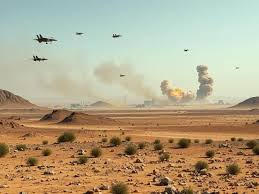The Israel-Iran conflict has entered a dangerous new phase with missile barrages, threats of nuclear retaliation, and an alarming revival of the “Islamic Bomb” narrative. The first week of open war has seen Israel launching air and missile strikes that devastated Iran’s nuclear facilities and reportedly killed top Iranian commanders. In retaliation, Iran unleashed over 370 ballistic missiles and hundreds of drones, some of which struck Israeli civilian and strategic targets, reported the Economic Times.
While Israel’s government confirmed it had destroyed key sites like Natanz and Isfahan, its claim of hitting Bushehr nuclear facility was later retracted. However, the possibility of a nuclear catastrophe similar to Chernobyl has drawn global concern, with Russia warning against attacks on nuclear sites.
Iran’s Islamic Revolutionary Guard Corps (IRGC) announced the launch of several advanced missiles, including the Fattah-1 and Fattah-2, Sejjil, and Qadr-110. According to Tehran, these hypersonic and long-range missiles were designed to bypass Israel’s Iron Dome defense system. Iranian sources say this is part of “Operation True Promise 3,” a series of attacks targeting Israeli military infrastructure.
Yet, experts remain skeptical. Israeli analyst Yehoshua Kalisky and UK’s Royal United Services Institute believe Iran’s missiles lack the maneuverability to evade modern interception systems, despite their speed.
What’s most alarming is the nuclear rhetoric. Iranian commander Major General Mohsen Rezaei claimed that Pakistan has promised to retaliate with nuclear weapons if Israel uses its own arsenal against Iran. This statement, although unverified by Islamabad officially, hints at a dangerous expansion of the conflict.
Pakistan’s Defence Minister Khwaja Asif also called for Muslim unity, warning that if the Ummah doesn’t unite now, each nation could face a similar fate. These statements resurrect memories of the 1970s and 1980s, when Pakistani leaders Zulfikar Ali Bhutto and Zia-ul-Haq spoke of creating an “Islamic Bomb” to counter Western nuclear dominance.
Israel, believed to possess around 90 nuclear warheads according to SIPRI, has long kept its nuclear status unofficial. However, statements from Prime Minister Netanyahu and former President Donald Trump have hinted at a no-holds-barred approach.
Rumors also suggest that Israel may be allowing some missile strikes to land to justify a large-scale response. But open use of nuclear weapons would shatter decades of ambiguity and invite international backlash.
Iran has proudly presented its Fattah missile as a game-changing hypersonic weapon, capable of speeds exceeding Mach 15 and penetrating deep defenses. Yet, experts argue that maneuverability is more critical than speed. Western analysts claim Iran lacks the technological capacity to fully realize the potential of these missiles.
Still, even the perception of hypersonic threats, coupled with nuclear posturing, adds to a combustible geopolitical environment.
The conflict threatens to pull in Pakistan, Russia, and even the United States, increasing fears of a broader war. US President Donald Trump has issued vague threats and demanded Tehran’s “unconditional surrender,” while suggesting he might target Ayatollah Ali Khamenei.
With nuclear rhetoric heating up, missile exchanges continuing, and alliances shifting, the Middle East stands at a dangerous crossroads. The specter of a nuclear arms race or accidental catastrophe looms large over a region already burdened with decades of war.




